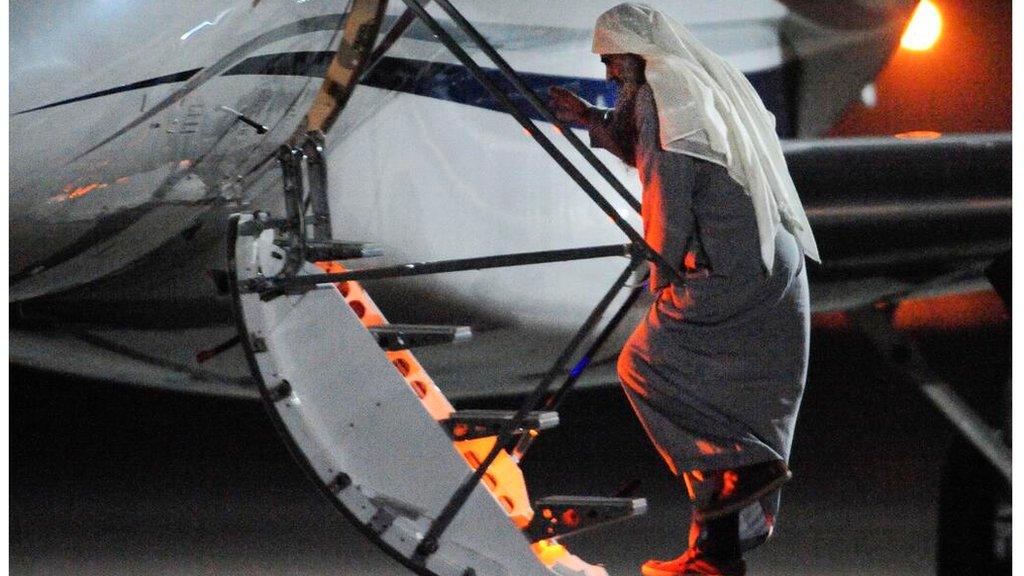Abu Qatada found not guilty by Jordan court of terror plot
- Published
Abu Qatada broke down in tears as he heard he was acquitted, says Gordon Corera
Radical Muslim preacher Abu Qatada has been found not guilty of terrorism offences by a court in Jordan, over an alleged plot in 1998.
A panel of civilian judges sitting at the State Security Court in Amman cleared him of conspiracy to carry out terrorist acts.
Abu Qatada was deported from the UK in July 2013. A verdict on another alleged plot was adjourned until September.
The Home Office said Abu Qatada would not be able to return to Britain.
Torture evidence
This verdict comes after a near decade-long legal battle to force the radical cleric to face trial in his home country, and will raise concerns that he may use his influence to destabilise the Jordanian state at a time of increasing turmoil on its borders.
Abu Qatada, whose real name is Omar Othman, was granted asylum in the UK in 1994 but the security service MI5 increasingly saw him as a national security threat as his views on jihad hardened.
He was accused of conspiracy to commit terrorist acts following a series of bombings, including of a hotel, in Jordan in 1998 and a foiled plot to carry out attacks on civilians in Jordan to mark the millennium.
He was convicted in his absence but the convictions were eventually thrown out because they had been based on evidence which may have been acquired by torturing Abu Qatada's co-defendants.
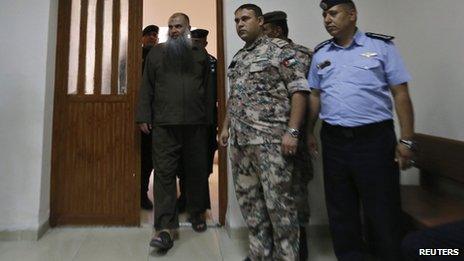
Abu Qatada was tried by a panel of civilian judges
A treaty signed last year by Jordan and the UK banned the use of such evidence from trials in Jordan, removing the final obstacle to deporting the man described by British judges as a "truly dangerous individual".
When he was deported from the UK in July 2013, Home Secretary Theresa May said she had been "as frustrated as the public" about the estimated £1.7m cost and length of time it had taken to remove him.
The cleric had fought his deportation since 2005.
Home Office minister James Brokenshire said: "Abu Qatada's re-trial in Jordan has been made possible thanks to this government's determination to successfully deport him from the UK.
"While the courts in Jordan have acquitted [Abu] Qatada of one of the two charges against him, it is right the due process of law is allowed to take place in his own country. We await a verdict on the remaining charge."

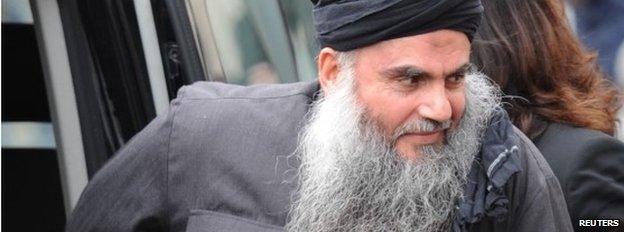
Analysis
Gordon Corera, BBC security correspondent
Abu Qatada walked into court with a smile and wave to his family and supporters as if sensing the day might go his way.
He sat a few feet away from me in an iron cage listening intently and occasionally mopping his brow as the lengthy verdict was read.
After he learned he was acquitted, he broke down in tears and his supporters cheered. After the hearing was over, he offered only a wry smile when asked if he had anything to say to the BBC.
He was taken away in an armed convoy, as he still has one more case against him with the verdict due in September.
Now, he may be more optimistic that he will soon be a free man but he will not be allowed to return to Britain where a deportation order remains.

Mr Brokenshire also said Abu Qatada is subject to a deportation order which means he will be unable to return to the UK. He is also subject to a UN travel ban.
A Downing Street spokesman said: "He can't come back and he won't come back to the UK. He is a Jordanian, he does not have a UK passport and would not be granted permission to enter the UK.
"The outcome of the thorough work done by the home secretary led to his deportation. The process now is for the Jordanian judicial system."
Following the preacher's acquittal, Deputy Prime Minister Nick Clegg told LBC radio: "It was important that we sent Abu Qatada, after lengthy delay, back to Jordan to face trial".
"What is absolutely clear to me is that this man needed to face justice and needed to do so out of the UK."
Commons Home Affairs Select Committee chairman Keith Vaz said he was surprised at the verdict.
"However, it is right that the Jordanian court has followed due process," he added. "There are still matters outstanding which need to be resolved."
"The British government was right to remove this man from the UK considering his extremist views and potential links to terrorism."
Shadow home secretary Yvette Cooper said: "Though Abu Qatada faces further charges in Jordan later this year, the home secretary should make it absolutely clear Abu Qatada would not be allowed to return to the UK.
"He was subject to a deportation order on the grounds of national security, so should be permanently excluded. The government will have our full support in enforcing this should any challenge arise."
Agreement 'betrayal'
The trial was conducted at the controversial State Security Court which is housed in a military base in Marka, a suburb in the capital Amman.
At an appearance in December, Abu Qatada complained about the presence of a military judge on the panel as a "betrayal of the agreement" under which he was deported.
This had specified that he must be tried by civilian judges. The make up of the tribunal was subsequently changed.
During the trial Abu Qatada reportedly spoke out about the conflict in neighbouring Syria, urging the two main jihadist factions there, the al-Nusra Front and the Islamic State in Iraq and the Levant (Isis), to unite behind the leader of al-Qaeda, Ayman al-Zawahiri.
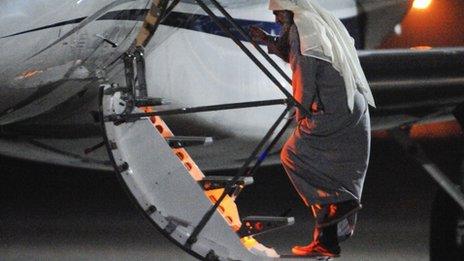
Abu Qatada was flown to Jordan from London after his deportation was approved
The BBC's Steve Swann, reporting from the trial in Amman, says that despite such outbursts, there was little to link Abu Qatada to the 1998 plot. Although judges ruled that the confession by a co-defendant had not been acquired through torture, it could not be corroborated by other witnesses.
A British judge had referred to this as "an extremely thin case" and this has now been proved, our correspondent added.
Smuggled writing
The BBC has seen evidence which suggests Abu Qatada has smuggled out messages and writings from his cell in the high security Muwaqqer prison to his supporters across the world.
Laith Alkhouri, senior analyst with Flashpoint Partners, monitors extremist content online from an office in New York. He has found numerous postings on the internet which claim to be in Abu Qatada's name.
In one, the cleric is alleged to have contacted al-Zawahiri to condemn Isis.
In a letter published by the al-Nusra Front in April the cleric denounced Isis as "the dogs of hellfire... because of their evil actions".
Elsewhere, he has written in praise of jihad as a tool for overthrowing tyrannical leaders of the Muslim world.
Mr Alkhouri told the BBC: "He's the star of the jihadist world so his writings, lectures and sermons are all taken very seriously. Every single word is taken very seriously by jihadists."
- Published26 June 2014
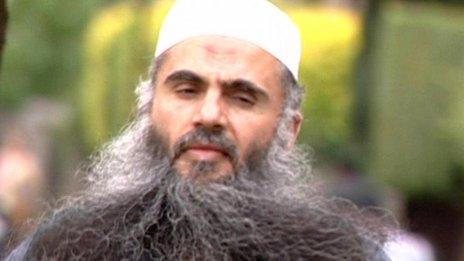
- Published7 July 2013
